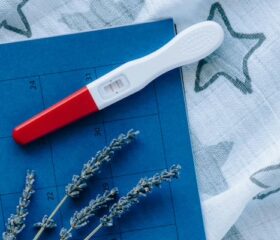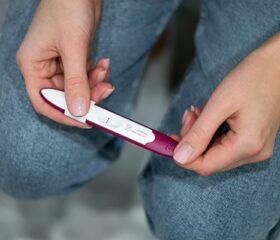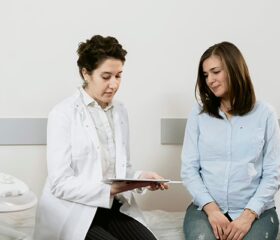Common Signs of Pregnancy When You Have Irregular Periods
If you have irregular periods, keeping an eye out for the classic first alert of a potential pregnancy—a missed period—won’t really work for you.

It can be hard to tell if you’re late or your period is just following its own unpredictable schedule. The good news is that a missed period isn’t the only sign your body will give you when you conceive, which means it’s still possible to tell that you’re pregnant when you have an irregular cycle.
Read on to learn what early pregnancy signs you should watch for, when you should take a pregnancy test, and when you should see a doctor about your menstrual cycle.
What does having an irregular period mean?
Having irregular periods means that you don’t have a normal menstrual cycle.
Typically, women’s cycles range from 21 to 35 days, with an average of 28 days (meaning that’s how long it takes from the start of one menstrual period to the next). Your cycle is irregular if its length consistently falls out of this range. 1
Your cycle is also considered irregular if you regularly miss periods (more than three in a row) or if there’s significant variation in the length of your cycles from one month to the next.
Irregular periods may be accompanied by other symptoms
Doctors sometimes refer to menstrual cycles as being “irregular” if they’re accompanied by other symptoms that most women don’t get, like a flow that’s lighter or heavier than average, unusually severe cramps, or bleeding in between periods (spotting).
Common early pregnancy signs when you have irregular periods
A missed period is usually the first clear sign of pregnancy that women get, but obviously, it’s harder to tell when your period is late with irregular cycles.
However, you can still watch for other early pregnancy signs to get an idea of whether you’ve hit the jackpot. 2 3
Breast or nipple tenderness
Breast pain during pregnancy often strikes very early on, sometimes appearing 1–2 weeks after conception. 2 Your pregnancy hormones may make your breasts and nipples feel sore, tingly, “fuller,” or heavier, as well as sensitive to touch.
Spotting (implantation bleeding)
Implantation occurs several days after conception. When the fertilized egg implants itself into your uterine lining, it can cause a type of early-pregnancy spotting known as implantation bleeding. This is typically light, doesn’t last very long, and starts before your period would have normally been due. 4
Fatigue
Getting pregnant triggers changes in your hormone levels. These can cause a whole host of symptoms, including fatigue (unusual tiredness). This starts earlier than many other pregnancy symptoms, potentially just a week after conception. 2
Heartburn or constipation
Your increased hormone levels can also slow down your digestion, leading to heartburn and pregnancy constipation. 5 You might also experience some mild cramping and bloating during pregnancy.
These digestive woes are sometimes accompanied by heartburn (indigestion). However, while heartburn can start in early pregnancy, it’s more common later on, when your growing uterus pushes your stomach and forces stomach acid to flow back up your esophagus. 6
Changes in your mood and your taste in food
Pregnancy is a time of changes. You may experience the following two symptoms in its early stages:
- Food cravings and aversions during pregnancy: Many pregnant women suddenly develop a strong desire for types of food they previously wouldn’t touch, or, conversely, an intense dislike for former favorites. Pregnancy cravings and aversions can start early and can last until you give birth, although they can also be temporary.
- Mood swings: You may also experience wild shifts in your mood. Again, this is due to pregnancy hormones and can occur within a few weeks of conceiving (the period between weeks 6 and 10 is usually when pregnancy mood swings start). 2
Increased urination
You may find yourself making more frequent trips to the bathroom after conceiving. That’s because your body increases your blood volume when you become pregnant, which, in turn, makes your kidneys filter more fluid and produce more urine. As your uterus expands, it also puts more pressure on your bladder. 5
When should you take a pregnancy test with irregular periods?
Generally, the earliest you can take a pregnancy test is 1–2 weeks after a missed period. However, this is clearly challenging if you have an irregular cycle. 7
An alternative timing strategy is to count from your last period. Take the test 36 days from the start of your last menstrual period. 8
By that point, if you’re pregnant, your urine should have enough human chorionic gonadotropin (hCG)—the pregnancy hormone that at-home tests check for—to be detectable. If your test is negative but you still suspect you’re pregnant, wait a few days to a week and test again.
How to maximize your test accuracy
Test first thing in the morning. That’s typically when your urine has the highest concentration of hCG. 7
If you have no choice but to test later in the day, avoid drinking a lot of fluids in the hours before taking the test. Doing so can dilute your urine and potentially result in a false negative pregnancy test.
If you get a positive result, schedule an appointment with your doctor immediately to confirm the pregnancy and discuss prenatal care. 8
How to improve your chances of conceiving with irregular periods
If your periods are unpredictable, it means your ovulation timing (i.e., your fertile window) could also be erratic. This makes it harder for you to determine when you should try to conceive, but it’s not impossible.
There are several ways to improve your chances of getting pregnant with irregular periods. Using an ovulation calculator may help. You can also look out for ovulation symptoms, such as your cervical mucus becoming clear and stretchy and your basal body temperature (BBT) spiking. 9
Should you see a doctor for irregular periods?
In some cases, irregular periods may be part of several factors affecting your fertility. For instance, missing your period can mean that you’re not ovulating at all or (in rare cases) that you have an infertility-related medical issue like polycystic ovary syndrome (PCOS). 10 11
Irregular menstrual cycles can also be caused by:
- Primary ovarian insufficiency (POI)
- Thyroid dysfunction
- Eating disorders (e.g., anorexia nervosa or bulimia)
- Uterine abnormalities (e.g., growths of fibroids)
- Chronic or acute stress
You should also see a doctor if you’re struggling with infertility issues (i.e., you’re under 35 and have been trying to conceive for a year with no success, or you’re over 35 and have been trying for six months). 11
How do doctors treat irregular periods?
The approach your doctor takes to managing your irregular periods will depend on the diagnosed cause. For instance, if you have PCOS, your doctor may prescribe you hormonal birth control (e.g., IUDs, shots, or pills) to normalize your cycle. 12 10
Other conditions may require other treatments. The only way to know for sure what’s needed is to get checked out.
Final thoughts
An irregular cycle can make noticing that initial missed period much harder. Luckily, it won’t change the other fundamental signs of early pregnancy.
Again, if you have concerns about your irregular periods, your fertility, or whether or not you’re pregnant, the best course of action is to talk to your doctor.
Article Sources
- Eunice Kennedy Shriver National Institute of Child Health and Human Development. "What are menstrual irregularities?" Retrieved May 29, 2025.
- Eunice Kennedy Shriver National Institute of Child Health and Human Development. "What are some common signs of pregnancy?" Retrieved May 29, 2025.
- South Dakota Department of Health. "Early Signs of Pregnancy" Retrieved May 29, 2025.
- MedlinePlus. "Vaginal bleeding in pregnancy" Retrieved May 29, 2025.
- Maternal and Infant Health Program. "Discomforts of Pregnancy" Retrieved May 29, 2025.
- Cleveland Clinic. "Heartburn During Pregnancy" Retrieved May 29, 2025.
- U.S. Food and Drug Administration. "Pregnancy" Retrieved May 29, 2025.
- Office on Women's Health. "Pregnancy tests" Retrieved May 29, 2025.
- American Pregnancy Association. "How to Track Ovulation With Irregular Periods" Retrieved May 29, 2025.
- MedlinePlus. "Polycystic Ovary Syndrome" Retrieved May 29, 2025.
- U.S. Centers for Disease Control and Prevention. "Infertility: Frequently Asked Questions" Retrieved May 29, 2025.
- Office on Women's Health. "Period problems" Retrieved May 29, 2025.







